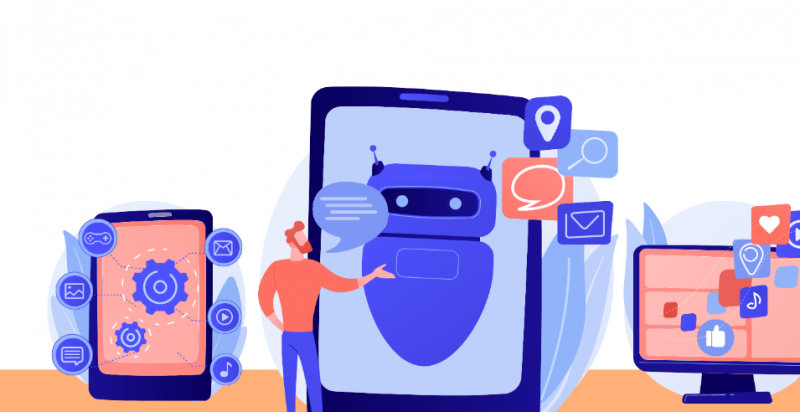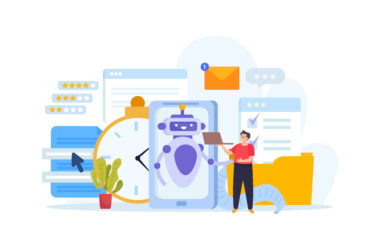Introduction:
Automated Content Creation, supported by Generative AI services, is a key element in modern business planning. This strategy expedites content creation while enhancing marketing campaigns and boosting customer interaction.
With the help of generative AI services, businesses can easily create various content types, including blog posts, social media updates, and more. By redefining the paradigms of content creation, this innovative strategy gives businesses a significant competitive advantage.
Generative AI, in essence, revolutionizes content generation by automating the creative process, boosting efficiency, diversity, and scalability in content production. As a result, it becomes a crucial tool for contemporary enterprises navigating the digital terrain.
This blog will look at the benefits of using Generative AI for generating content, its benefits, challenges, and other details. So, without further ado, let’s get started.
Harnessing the Power of Generative AI
Understanding what Generative AI is and how it works
Modern content generation techniques are based on generative AI powered by neural networks and machine learning algorithms. Automated writing technology used in this game-changing technology, also known as AI-powered content generation, is reshaping the world of content marketing.
Generative AI uses AI-driven content tools and solutions to create a wide variety of content, including blog posts, social media updates, and articles. This technology mimics human-like creativity, modifying content for multiple purposes by deciphering patterns from large datasets.
Generative AI, can expedite operations, improve scalability, and produce dynamic, high-quality content, is emerging as a crucial component as businesses increasingly employ automated content creation.
Benefits of using Generative AI for content creation.
There are numerous advantages of Generative AI, such as
- Improves Content Creation: Generative AI speeds up the production of many forms of content, saving time and materials.
- Increases Scalability: Companies may easily increase the material they produce to keep up with rising demand without sacrificing quality.
- Ensure consistency: Consistency is ensured via AI-powered content generation, which keeps a consistent brand voice and aesthetic across all platforms.
- Streamlines Creative Processes: By automating content development, creative teams may concentrate on more strategic and high-level responsibilities.
Moreover, By automating the processes involved in content production, generative AI drastically decreases manual labor and frees up labor resources for strategic activities.
AI in content marketing improves the overall quality of content by providing consistent and customized output, reducing errors, and freeing up creators to concentrate on honing their content strategies and creativity.
Real-world applications across various industries
Many sectors use AI-powered content development to improve operations and engage audiences. Automated product descriptions improve catalog management in e-commerce by saving time and upholding uniformity. AI-generated news updates help journalism by enabling quicker coverage of breaking news.
Advertising campaigns are improved due to AI creating customized ads that align with consumer preferences. These industries use AI-driven content solutions to speed up content production, allocate resources more effectively, and deliver customized content that appeals to audiences.
With the help of this Automated Content Creation with Generative AI technology, businesses can respond quickly to changing market conditions and engage consumers with high-value content.
Transforming Industries with Automated Content
Case studies showcasing successful implementation.
1. The Washington Post
One of the US’s largest and most popular newspapers is The Washington Post. The newspaper began utilizing Heliograf, an AI writing tool for creating content that automates the production of news stories, in 2020.
Heliograf analyzes data and produces real-time news stories using machine learning algorithms. With this tool, The Washington Post could produce more articles covering more events than ever before and do it in a fraction of the time it would have taken if it had used human reporters.
As a result, The Washington Post’s readership and interaction have significantly increased.
The Washington Post case study is a great example of how businesses may expedite their content development processes using AI writing tools. This case study emphasizes the value of utilizing AI-powered solutions to stay current with the media and journalism landscape’s constant change.
2. Alibaba
A well-known e-commerce pioneer, Alibaba has taken advantage of AI-generated content’s potential to improve client relations. Alibaba efficiently monitors and responds to client inquiries by creating individualized responses using an AI-powered chatbot.
Their customer support procedures are substantially more effective thanks to this intentional usage of AI-generated content, improving user experiences and streamlining communication1. This cutting-edge method emphasizes how drastically AI is changing client engagement in e-commerce.
Few statistics on the succession of the role of AI in content creation
With 82% of marketers recognizing AI-generated content quality as being on par with human-generated content, it has become clear that content creation and marketing have always been different.
This increase in productivity is obvious because 45% of marketing professionals spend half of their workweek creating content. AI-powered tools speed up this procedure, generating content quickly while saving businesses time and money.
Impressively, 88% of marketers attest to the advantages of these technologies for saving time. Anecdotal evidence suggests that marketers who use AI for content generation have improved consumer interactions and increased productivity with short-form content.
Although there are obstacles, there is no denying that Generative AI has had a revolutionary impact on marketing tactics and content development.
Overcoming Challenges and Limitations
Addressing common concerns about AI-generated content.
Utilizing the benefits of content automation, machine learning, and AI-powered writing tools will help to address frequent concerns about content produced by artificial intelligence.
Even though concerns about authenticity and quality still exist, effective execution guarantees brand alignment. Regular human review of the output reduces the likelihood of errors.
Businesses may use the potential of AI content marketing to produce high-quality, pertinent, and engaging content that resonates with their target audience by concentrating on strategic deployment and training.
Overcoming the challenges
The emergence of AI-generated content has posed authenticity, originality, and quality issues. The accuracy with which machine learning algorithms can reproduce human creativity is a subject of skepticism.
However, with careful execution and human control, these worries can be alleviated. Companies may ensure AI-generated content adheres to their brand identity by establishing explicit standards and parameters.
AI-generated drafts can be improved by routine human inspection, which can also correct mistakes and provide customized touches. Combining the strength of automatic writing tools with human experience protects work that lacks authenticity, keeping the necessary criteria for originality and quality.
Crafting Compelling Content Strategies
Integrating Generative AI into content marketing strategies.
Businesses can ensure messaging consistency and brand alignment by utilizing Generative AI services for automated content production.
With the help of these technologies, brands are able to maintain a consistent and on-brand communication strategy across their marketing campaigns while streamlining content generation and allowing for customization.
Utilizing AI for creativity and brainstorming.
Using topic ideas, AI, like Generative AI services, helps content writers surpass their creative barriers. Automated article generation tools inspire writers to take fresh approaches in various genres.
Platforms like Clearscope and Frase use AI to recommend SEO-optimized subjects, improving content ideation. This use of AI-driven content technologies helps uncover novel ideas and stimulate creativity to create more powerful content.
Leveraging AI for creating diverse content formats.
In the creation of articles, infographics, and videos, generative AI finds a variety of uses. The adaptability of this technology enables companies to expand their content offerings while producing a variety of assets quickly.
Generative AI’s powers boost content diversity, enabling marketers to cater to various audience preferences and communication platforms, from textual pieces to aesthetically appealing infographics and even video scripts.
The Human Element: Collaborating with AI
How content creators and AI can work together synergistically.
Generative AI can easily work alongside humans to create content, allowing them to concentrate on strategic elements. While AI efficiently produces content, human insights help it align its output with brand voice and objectives.
This collaboration guarantees that AI productivity works with human expertise, establishing the right balance between content quality and strategy to foster a mutually beneficial relationship that supports successful AI content marketing.
Enhancing human-AI collaboration for superior output.
Effective collaboration between human writers and AI algorithms involves clear guidelines and mutual understanding. For example, AI-generated data-driven insights augment human analysis in journalism, improving news coverage.
Gen AI creates rough drafts for content marketing, which human writers polish for brand alignment. This collaborative production demonstrates how AI enhances human creativity, increasing productivity and content quality.
A good content production process depends on both parties contributing their abilities in a healthy balance.
Future Trends and Possibilities
Predictions for the future of AI in content creation.
The future of generative AI technology promises greater contextual understanding and higher-quality material. The revolutionary impact of AI on content creation is emphasized by experts who anticipate more advanced algorithms that can understand complex contexts.
By automating repetitive jobs and enhancing creative processes, this evolution will optimize content strategies and reshape the content landscape in a way that combines AI’s skills with human inventiveness rather than replacing human input.
Advancements in Generative AI technology.
Expect further advances in adaptable style, more inventiveness, and multilingual content development from AI. By producing material in various languages and styling it according to different tastes, these advances are poised to change content development tactics and increase audience reach.
While procedures will be streamlined by the AI’s greater creativity and the smooth integration of these capabilities into automated writing tools, new ideas will be stimulated.
This confluence of innovations is ready to reshape paradigms for content generation and enhance AI content marketing methods.
Emerging tools and platforms in the content automation solution space.
The landscape is changing due to new AI-powered platforms and technologies for automated content generation.
These modern solutions guarantee content relevancy and engagement with cutting-edge features like natural language processing and data-driven insights. Streamlining content creation will increase consistency, and efficiency and benefit businesses.
As these technologies multiply, businesses can improve their content strategy, allocate resources more efficiently, and communicate with their target audiences more effectively, ushering in a new era of AI-driven content creation.
Conclusion
In conclusion, generative AI has a significant impact on the production of content. It boosts creativity, preserves consistency, and expedites productivity. AI-generated content crosses mediums, from articles to videos, creating new opportunities for engagement.
The symbiotic interaction between human input and AI capabilities makes a holistic approach possible. Adopting an AI-powered content strategy is essential to succeed in the dynamic digital world.
Businesses can get a competitive edge by examining these transformational technologies, effectively catering to varied audience tastes while retaining brand authenticity.
This fusion of human expertise and AI innovation raises the bar for content creation and ensures its relevance, resonance, and success in a constantly changing environment.
FAQs:
Can AI-generated content replace human writers entirely?
AI-generated content can automate some elements of content creation, but it still has a limited capacity to replace human writers completely.
AI can speed up production and produce writing but needs more complex inventiveness, feelings, and a grasp of context that human writers provide. Collaboration between human and AI writers strikes a balance, ensuring high-quality, authentic content creation.
How do I ensure the uniqueness and quality of AI-generated content?
Setting precise parameters, enhancing AI algorithms, and relying on human monitoring are necessary to ensure the originality and caliber of information produced by AI. Content must be regularly reviewed, adjusted, and aligned with brand rules to ensure originality and high standards.
Are there any legal concerns related to using AI-generated content?
Yes, AI-generated work has legal challenges, such as copyright ownership, plagiarism, and ensuring that intellectual property regulations are followed. When using AI-generated materials, proper attribution and knowledge of the source of the content are crucial to avoiding any potential legal issues.
What industries have seen the most benefit from automated content creation?
Automated content generation has greatly benefited the e-commerce, journalism, advertising, and digital marketing sectors.
These industries use AI-powered solutions to optimize resource allocation, improve engagement, and streamline content production, enabling them to stay competitive and adaptable in the quickly changing digital market.
Can AI-generated content adapt to different brand voices and styles?
Yes, AI-generated content can be taught to adjust to various brand voices and styles. AI can learn and duplicate different tones, vocabulary, and styles through data input and machine learning algorithms, guaranteeing that the material generated is consistent with the distinctive personality of diverse companies.










